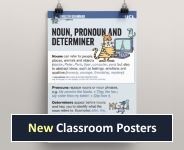Verb phrases
The National Curriculum does not recognise verb phrases as such. Instead, the notion of clause is defined as "a special type of phrase whose head is a verb".
Here at Englicious we use the term 'verb phrase' in a slightly different way. For us verb phrases are phrases whose Head word is a verb, called the main verb (sometimes also called a lexical verb).
A verb phrase includes a single main verb, either:
- on its own, e.g. laugh, swam
- or following one or more auxiliary verbs, e.g. will laugh, has been swimming
The main verb conveys the primary process, action or state. Auxiliary verbs work alongside main verbs to assist in creating different shades of meaning.
In the examples below, the verb phrases are marked in square brackets, and the main verbs are highlighted.
- The referee from Cornwall [blows] his whistle. [S2A-017 #1]
- Billy Dee, the little Luton runner, [has gone] in front now. [S2A-007 #80]
- The $80m relief effort [is being coordinated] by the United Nations. [W2C-002 #98]
- However, I [will speak] to you shortly. [S1A-095 #159]
What about the following example?
- Rainforests [are] rich in animal species. [W2B-021 #1]
This example has a VP consisting of a single verb (are). It is worth reminding yourself – if you are unsure – that verbs do not necessarily have to describe a physical action: they can describe a state of being or coming into being as well. (Be and become are called linking verbs or copular verbs.)
The verb be can also occur as a main verb with a preceding auxiliary verb, as in the example below:
- The combined salaries of the Front of House Manager [will be] less than the current combined salaries of Deputy Manager and Theatre Secretary. [W1B-018 #144]
Welcome!

Englicious is totally free for everyone to use!
But in exchange, we ask that you register for an account on our site.
If you’ve already registered, you can log in straight away.
Since this is your first visit today, you can see this page by clicking the button below.

